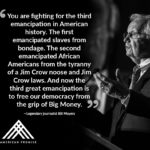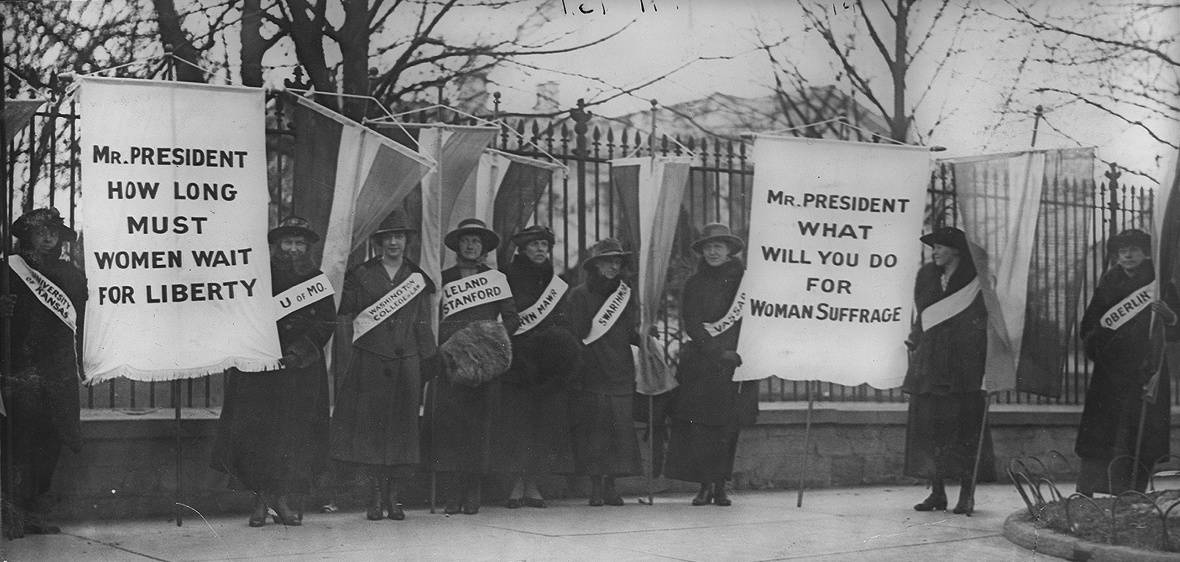“You are fighting for the third emancipation in American history. The first emancipated slaves from bondage. The second emancipated African Americans from the tyranny of a Jim Crow noose and Jim Crow laws. And now the third great emancipation is to free our democracy from the grip of big money.” —Political journalist Bill Moyers, National Citizens Leadership Conference, 2018

The United States of America—the greatest experiment in democracy ever attempted on Earth—gives political power to three equal branches of government. But there is another great power codified into this nation. It’s the ultimate power of the people to define and determine the framework of our own country: the amendment process, owned by the citizens of the United States. Throughout history, Americans have used the amendment process to redefine both the meaning of democracy and the destiny of our nation. This week, as we celebrate the life and accomplishments of one of our greatest American heroes, Martin Luther King Jr., it is time we redefine equality and justice under the law once more and pass the 28th Amendment to the Constitution to end the undue influence of big money in our political system.
The founding documents of our nation ascribe political power to the three branches of government, each with the strength to balance the other branches, creating a self-regulating system with an ingrained set of checks and balances. The judicial branch is unique, however. As the only unelected branch of the federal government, and with lifetime appointments, the Supreme Court has long caused consternation as the least democratic of the highest levels of government.
Yet the high court’s influence is balanced by another distinctly powerful group, one able to shift the foundation of our laws: The people of the United States of America.
Over two and a half centuries, Americans have exercised this power well. The citizens of the United States have driven crucial and fundamental changes in our nation’s history—changes that have expanded the rights of democracy and advanced the ultimate promise of our nation: equal representation for all.
Nearly all of these changes have emerged through the amendment process that enables Americans to change the legal foundation of our government.
Today we celebrate one of the most important people-led movements in American history: The Civil Rights movement, which began with the bloodiest war in our nation’s history and continues today. Throughout this fight for equality, the amendment process has been used again and again. The 13th Amendment abolished slavery. The 14th Amendment established black men as citizens. The 15th guaranteed the right to vote to these citizens. Years later, the 24th Amendment abolished the poll tax, long used to guarantee white, privileged men rights over other citizens.
And nearly 100 years after the Civil War, people again came together in the 1960s Civil Rights movement, led by MLK Jr. In these movements, Americans of all stripes united to assert that we do indeed mean the promise written in our founding documents: that all people are created equal. Despite, and perhaps in light of, the seeming absoluteness of the judicial branch, America’s founders established the Constitutional amendment process so citizens could correct, change or update the laws that govern our nation. The amendment process gives citizens, through their elected representatives, an ultimate way to define the nation’s laws. Let’s take a look at—and gain inspiration from—how Americans have used the amendment process to redefine what it means to be equal under the law.
The 13th, 14th and 15th Amendments
The struggle over equal rights for all men, regardless of race, split our nation in two and led to the bloodiest conflict in U.S. history. The Civil War raged from 1861 to 1865 and left hundreds of thousands of Americans dead.
Despite the seemingly obvious unConstitutionality of slavery in today’s lens, at the time it was upheld by the highest court in the land. Shortly before the war, in 1857, the Supreme Court ruled 7-2 in Dred Scott v. Sandford that black people could not become American citizens and upheld the legality of slavery. This ruling helped trigger the start of the war.
After the war’s conclusion, one of the first priorities of the reunited nation was to overturn the Dred Scott decision. The 13th Amendment, ratified in 1865, began to undo the Dred Scott ruling by banning slavery. In 1868, the 14th Amendment extended citizenship to black Americans and established legal protections for all citizens. The 15th Amendment, ratified another two years later in 1870, marked the end of the Dred Scott ruling’s influence by giving voting rights to black men. These three amendments are collectively known as the Civil War amendments.
While these amendments began to expand democratic rights to disenfranchised groups, women still did not have a protected right to vote. Four years after the 15th Amendment granted black men the right to vote, the Supreme Court ruled that women did not have the same Constitutional guarantee.
The 19th Amendment
The Women’s Suffrage Movement began in 1848 at a women’s rights convention in Seneca Falls, New York, and lasted decades. Suffragists—including not only Susan B. Anthony, Lucretia Mott and Elizabeth Cady Stanton, but also Ida Wells, Sojourner Truth and Anna Julia Cooper—fought the male-dominated political system to give women an equal say in our national destiny.
Attempting to win a judicial victory granting women the right to vote, Virginia Minor, a suffragist, applied for voter registration in 1872 in Missouri, a state that prohibited women from voting. After she was denied registration, Minor sued the state, claiming that voting was a privilege or immunity protected by the 14th Amendment. In 1874, the Supreme Court unanimously ruled in Minor v. Happersett that the 14th Amendment did not extend the right to vote to female citizens.
Inspired by the expansion of voting rights to black men through the Constitutional amendment process, and frustrated with the Supreme Court, suffragists gave up their pursuit of a judicial victory and instead focused on growing support in Congress and the states, hoping to pass an amendment of their own.
Through organized rallies, protests and action, the national movement for women’s suffrage grew and pressure built in Congress and the states. In 1920, more than 60 years after the movement began, the 19th Amendment was ratified, prohibiting voter discrimination on the basis of sex and overturning the Minor decision.
The 24th Amendment
The poll tax was used through the early 1960s to disenfranchise minority and low-income voters. In the 1930s, voters challenged the poll tax in the courts when Nolan Breedlove, a white man, refused to pay the tax and sued the state of Georgia. In 1937, the Supreme Court unanimously ruled in Breedlove v. Suttles that enacting a poll tax was a state’s right.
The Civil Rights Movement, led by MLK Jr., Rosa Parks, Asa Philip Randolph, John Lewis and other civil rights heroes, spurred great social and legislative changes to expand rights for African Americans. One major accomplishment that came out of the movement was the 24th Amendment, abolishing the poll tax. Ratified in 1964, the 24th Amendment overturned the Breedlove decision.

The 26th Amendment
During World War II and the Vietnam War, 18-, 19- and 20-year-old men drafted to serve in the military were barred from voting, as the minimum voting age was 21. Starting during World War II, citizens began to call out this hypocrisy, arguing that those old enough to fight and die for the country should be able to vote.
With increasing pressure during the Vietnam War, Congress in 1970 passed the Voting Rights Act, a wide-ranging law that included lowering the voting age to 18. Four states—Oregon, Arizona, Idaho and Texas—sued, saying the law violated the rights of states to make election-related laws. In a 5-4 ruling in Oregon v. Mitchell, the Supreme Court upheld Congressional authority on each part of the Voting Rights Act except the authority to lower the voting age for state elections.
Seeing the loss in the Supreme Court, citizen pressure for an amendment rose, and the 26th Amendment was ratified just a year later in 1971, overturning Oregon v. Mitchell. The Amendment codified the minimum voting age for all elections as 18 in the Constitution.
The 28th Amendment
In the nine years since the Citizens United v. Federal Election Commission Supreme Court ruling, wealthy special interests, corporations, big unions and Super PACs have increasingly pumped money—billions of dollars in our most recent election cycle—into local, state and federal elections. These campaign expenditures have been proven to afford greater political influence to ultra-wealthy individuals and corporations over regular citizens.
Through rulings including Buckley v. Valeo (a 7-2 ruling decided in 1976) and most notably Citizens United (a 5-4 ruling decided in 2010), the Supreme Court has deemed political spending of nearly every type to be free speech under the First Amendment.
This radical misinterpretation of our Constitution, which strips core principles of political equality and anti-corruption out of the First Amendment, has created the most brutally efficient way to allocate political power and representation based on wealth, rather than on our equal citizenship as Americans.
Citizens across the political spectrum are standing up for our liberties and republican government. In reality, most citizens see that the unlimited influence of big money in our elections undermines our rights to equal free speech under the law and incentivizes some elected officials to pander to wealthy special interests rather than their constituents.
As we have done so many times in the past, the American people must come together to overturn a Supreme Court ruling that upheld a fundamentally undemocratic interpretation of our political system—in this case, rewarding ultra-wealthy citizens and groups with more political rights than others. It is time once again for the American people to use our ultimate power and assert democracy by passing the 28th Amendment.
On the first day of the 116th Congress, the 28th Amendment was reintroduced in the House of Representatives by a cross-partisan group of legislators. The Amendment would allow Congress to set common-sense limits on campaign contributions and distinguish between people and corporations or other entities. The Amendment has bipartisan backing, but more lawmakers’ support is needed to send it to the states. Americans must come together and call on our elected representatives to support the 28th Amendment and uphold the true promise of our democracy: with liberty and justice for all.
How you can help make history.
Advance the amendment in less than 2 minutes: Sign our petition to show your support for the 28th Amendment. (Have 5 more minutes? Ask three friends to do the same.)
Take 10 minutes to weigh in. Call your Representatives to ask for their support on the 28th Amendment.
Get involved. Check our website to see if there is an American Promise Association in your area or find out how you can help launch an APA.






